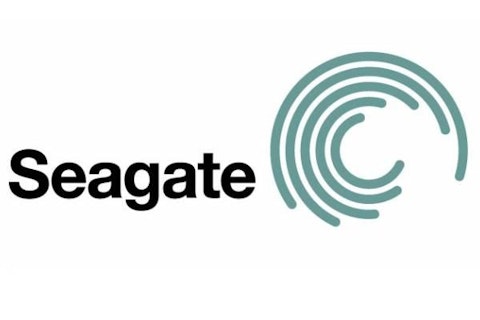The evidence is starting to get overwhelming — the days of the traditional PC are coming to an end. On Monday, research group Gartner said PC shipments would decline more than 10% in 2013, while tablet shipments are poised to jump by nearly 70%.
Gartner expects consumers to opt for tablets, smartphones and new, “ultramobile” devices (Gartner defines ultramobiles as Chromebooks and hybrid tablet/laptop devices like the Surface Pro or Samsung’s ATIV Q) in place of traditional desktop and laptop PCs.
Hard drive maker Seagate Technology PLC (NASDAQ:STX) looks to be particularly exposed to the shift, while Microsoft Corporation (NASDAQ:MSFT) stands to lose its operating system monopoly. One might expect Apple Inc. (NASDAQ:AAPL) to do well in a world where mobile devices are dominant, but that isn’t necessarily the case.
The decline of the PC
At this point, “the PC is dying meme” has become a bit of a cliche. But that said, it’s pretty well supported by the data. In addition to Gartner’s projections released on Monday, sales of traditional PCs have been steadily declining for months.
In the first quarter of this year, PC shipments fell by nearly 14% — the biggest drop on record. PC-related companies have been undertaking aggressive measures to alter their businesses in the face of this shift: Dell Inc. (NASDAQ:DELL) and Hewlett-Packard Company (NYSE:HPQ) are focusing more on enterprise customers, Nvidia is getting into cloud gaming, and Microsoft radically overhauled its Windows operating system.
It isn’t that personal computing is dying — far from it. But the form factors are shifting. Desktop and laptops are still necessary in many (mostly business) cases, but mobile form factors are increasingly able to satisfy the computing needs of a great many people.
The death of the hard drive
One particular PC component that seems more exposed than others is the hard drive — mobile devices don’t use them. While a company like Intel Corporation (NASDAQ:INTC) might be able to transition to a mobile world by investing in different chips, a company like Seagate Technology PLC (NASDAQ:STX) seems existentially challenged.
Tablets and smartphones use flash memory, while ultramobile devices generally use solid state drives. Seagate Technology PLC (NASDAQ:STX) has some limited exposure to the SSD market, but largely remains a hard drive company.
With a price-to-earnings ratio of less than 7, and a dividend yield of 3.60%, Seagate Technology PLC (NASDAQ:STX) seems like an incredibly cheap stock. But if consumers are dumping desktops for tablets, the company could really struggle.
Microsoft’s lost monopoly
For almost 20 years, Microsoft Corporation (NASDAQ:MSFT) has more or less had a monopoly on the operating system business. Outside of a tiny group of Mac users, and a few Linux devotees, just about every computer made between 1995 and 2007 was running Windows.
But the rise of mobile devices has changed that. Combined, Apple Inc. (NASDAQ:AAPL)’s iOS and Google’s Android account for well over 90% of the tablets and smartphones out there, and Gartner does not expect that to change.
Microsoft Corporation (NASDAQ:MSFT) has attempted to crack into the mobile market with Windows 8 and Windows RT, but its efforts have fallen flat. Windows 8 adoption has been sluggish, while sales of Windows RT tablets have been poor.
Ultramobile devices overwhelming run Windows 8. However, Gartner does not expect this group of machines to approach the size of the tablet market anytime soon.
Will Apple benefit?
Apple Inc. (NASDAQ:AAPL) largely invented the the mobile computing device market — both the iPhone and iPad were instrumental in starting the revolution.
But going forward, the company might not benefit as much from the change as one might expect. Gartner notes that consumers are increasingly opting for basic tablets in place of premium offerings.
The iPad Mini accounted for about 60% of iPad sales in the first quarter. Unlike say Amazon.com, Inc. (NASDAQ:AMZN), Apple Inc. (NASDAQ:AAPL) isn’t selling the Mini at cost, but it doesn’t make as much money from the Mini as it does the full-sized iPad.
Newer, cheaper Android tablets (like HP’s Slate 7) continue to hit the market. Continued growth in the mobile space might come more from these devices than from Apple Inc. (NASDAQ:AAPL)’s top-of-the-line offerings.
The changing PC market
The PC is changing like never before. Mobility — rather than pure power — seems to be the driving force behind the shift.
Increasingly, consumers are favoring tablets, smartphones and ultramobile devices. The need for traditional laptop and desktop computers won’t vanish overnight, but companies dependent on the sale of these machines could struggle.
The article The Traditional PC Is Dying and Consumers are Switching to Tablets originally appeared on Fool.com and is written by Salvatore “Sam” Mattera.
Salvatore Mattera is short shares of Seagate Technology (NASDAQ:STX). The Motley Fool recommends Apple. The Motley Fool owns shares of Apple and Microsoft. Salvatore “Sam” is a member of The Motley Fool Blog Network — entries represent the personal opinion of the blogger and are not formally edited.
Copyright © 1995 – 2013 The Motley Fool, LLC. All rights reserved. The Motley Fool has a disclosure policy.






